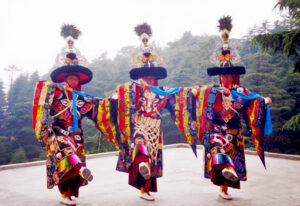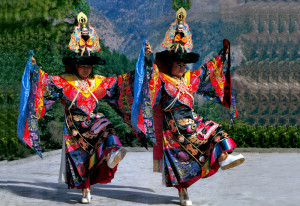Black Hat Dance
 The Black Hat dance is an elaborate ritual that took many days to perform in Tibet. The purpose of the ritual is to eliminate the obstacles, which in the individual are the afflictive emotions and misconceptions that cause sufferings.
The Black Hat dance is an elaborate ritual that took many days to perform in Tibet. The purpose of the ritual is to eliminate the obstacles, which in the individual are the afflictive emotions and misconceptions that cause sufferings.
At the beginning of the dance, the Black Hat Dancers make symbolic offerings of Gold Libation (tea) to the lineage lamas, tutelary deities (different forms of the Buddha) and Dharmapalas (truth protectors), in order to please them and receive their blessings. Then the dancers invite the Dharmapala’s consorts and their retinues to join them.
 As stated in the Vinaya, the code of monastic ethics, the robes of ordination serve as a reminder that the person wearing them is a fully-ordained monk. In a similar manner, the Black Hat costume is worn by some Tantric practitioners to maintain the clarity and pride of arising in the wrathful aspect of a tantric deity. This divine confidence or pride serves a special function for the exclusive path of Tantra. The Black Hat dancers apply protective substances on their cheeks and forehead which give them the wrathful appearance. They exhibit this fierce aspect in order to tame the minds of sentient beings afflicted by the negative emotions of hatred, greed, and ignorance. They are not motivated by anger, but by supreme love and compassion.
As stated in the Vinaya, the code of monastic ethics, the robes of ordination serve as a reminder that the person wearing them is a fully-ordained monk. In a similar manner, the Black Hat costume is worn by some Tantric practitioners to maintain the clarity and pride of arising in the wrathful aspect of a tantric deity. This divine confidence or pride serves a special function for the exclusive path of Tantra. The Black Hat dancers apply protective substances on their cheeks and forehead which give them the wrathful appearance. They exhibit this fierce aspect in order to tame the minds of sentient beings afflicted by the negative emotions of hatred, greed, and ignorance. They are not motivated by anger, but by supreme love and compassion.
According to some sources, the Black Hat dance came into existence as certain tantric deities appeared to some practitioners in this form during invocation rituals. The Elder Jamyang Dakpa, a contemporary of His Holiness the Fifth Dalai Lama (1617-1682) performed the dance while engaged in an exorcism ritual in the Deyang Shar courtyard of Potala Palace, in order to avert certain negative armed forces.
In Exile, the Namgyal monks perform the Black Hat Dance annually marking the end of a passing year during the prayer ceremony of Gutor-Chenmo, in the last month of the Tibetan calendar.
